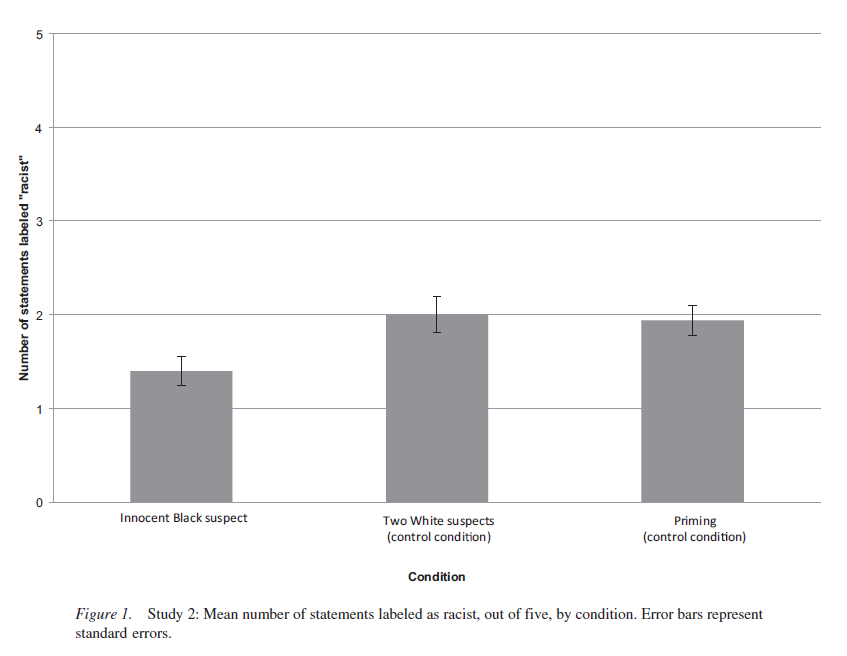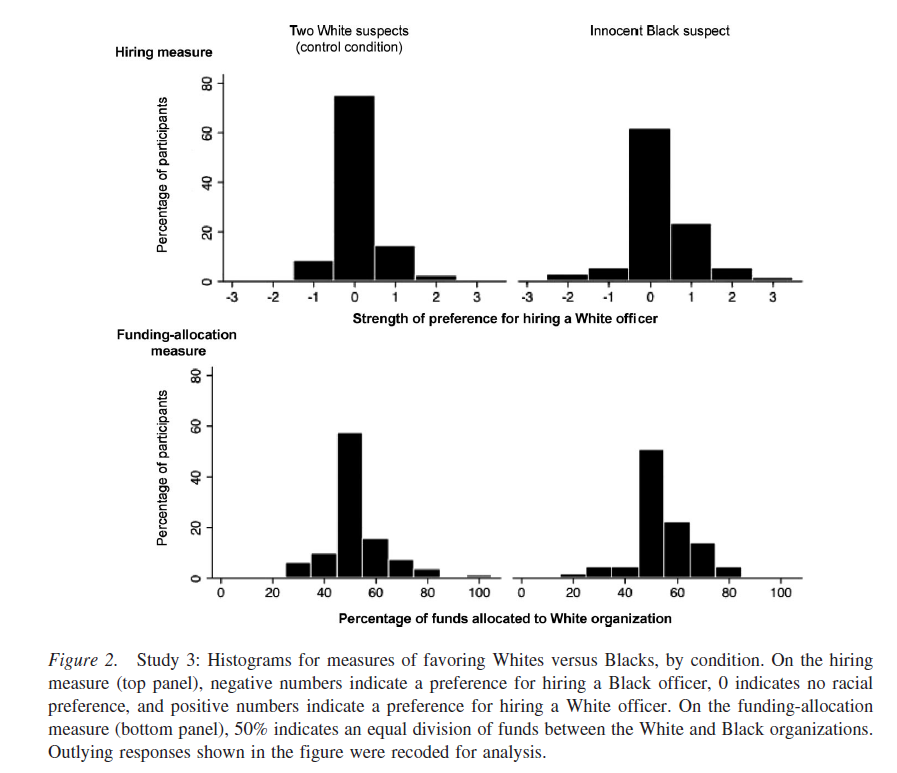Those of you who remember our discussion of System Justification Theory will recall that it posits (and goes on to demonstrate) that there are three overriding domains by which we guard our self-worth: ego motivation (“I like me”), group motivation (“I like us”) and system justifying motivation (“I like the way things are”). The balancing of these three motivations explains a great deal of behaviours that seem counter-intuitive or self-defeating, particularly in circumstances where power imbalances between groups are concerned.
When we consider race as a power imbalance, we would expect to find that the majority group is strongly motivated to preserve its ego when the fairness of the system is at risk. In other words, when confronted with a world that is clearly racist, there is considerable psychological pressure for members of the majority group to salvage their ego – the stereotypical “I’m not a racist” response. With the threat to our egos thus avoided, members of majority groups are then free to continue participating in an unfair system, confident in the knowledge that the ‘real’ problem is those ‘other’ people.
A fascinating new study from the Journal of Personality and Social Psychology sheds some light on the depths to which this behaviour can sink:
In a series of new studies from the Kellogg School of Management at Northwestern University, researchers report two new findings. First, when people worry that their behavior could seem racist, they point to past opportunities for racism they had been faced with but passed up—the “racist road not taken”—that ironically increases people’s willingness to express less racially sensitive views. Second, people actually distort their memories and convince themselves that they previously passed up opportunities for racism—opportunities that did not, in fact, exist.
“Our research suggests that people demonstrate remarkable flexibility when it comes to convincing themselves that they have proven their lack of prejudice,” said Daniel A. Effron, lead author of the studies and visiting assistant professor of management and organizations at the Kellogg School of Management. “The ability to point to blatantly racist behaviors that they didn’t perform seems sufficient for people to feel that they have non-racist credentials—even if virtually no one would have chosen to perform those racist behaviors. People are essentially willing to make a mountain of proof out of a molehill of evidence. “What’s more, our results show that people are willing to go even farther and invent the molehill, convincing themselves that they passed up opportunities for racism that they didn’t actually have,” continued Effron.
If you wish to read the full article, I have tried to make it available here (please do let me know if it doesn’t work).
A series of studies invited college students to choose between accusing a clearly guilty white suspect of a hypothetical crime, or a clearly innocent suspect who was black. In nearly all cases, the participants chose to accuse the white suspect (so hooray for progress). Participants in the study who chose to accuse the white suspect rather than the black suspect rated themselves as being more generally likeable than those who were asked to choose between two white suspects. In other words, they behaved exactly as SJT would expect, and bolstered their egos by clearly choosing to be “not a racist”.
Those of us who participate in racial conversations are aware that there is often not a ‘clear cut’ way of objectively identifying racist content in statements. There is a gradient of the level of agreement you’ll get from people identifying a statement as racist with “chink” at one end and “really good at math” at the other, and a whole lot of feverish denials and uncomfortable Thanksgiving dinners in between. The authors of this study explored whether or not an ability to remember “not racist” behaviour gives people psychological license to find things “not racist”, asking them to perform the same ‘identify the guilty’ task, and then rating statements for racist content:

As you can see from the above figure, while the effect size is comparatively small, the relationship is statistically significant: when given an opportunity to remember how “not racist” they were in not accusing a clearly innocent black person of a crime, participants were more likely to ‘go easy’ on themselves when deciding whether or not a racist statement had been made. In other words, having a recent example of yourself being “not racist” makes you more likely to ignore racism in your environment.
While much of the focus of discussions about racism tend to focus on overt displays of hatred, many forms of racism happen in environments where no interpersonal animus is necessary or possible. These can be incredibly damaging at a systematic level, as we have seen elsewhere. The question the authors explored is whether or not having a “not racist” cognitive escape route made people more justified in preferring their own group (white people) to an out-group (in this case, black people). They were asked to hire a police officer (either white or black), and to divide a pool of money between an organization that served either a predominantly black or a predominantly white community:

As above, we see a small but noticeable shift in attitudes when given the opportunity to appear “not racist” by exonerating a black person who is clearly innocent, allowing people to feel more comfortable favouring their own racial group. In the presence of a salient reminder of how racially virtuous and non-prejudiced they are, members of majority groups (in this case, white people) feel greater freedom to make hiring or funding allocation decisions based not on merit (which would be equal in this particular case), but rather on an explicitly racial criterion*.
I will have to continue this exploration in a subsequent post, because the other findings of this study are more fascinating still.
Like this article? Follow me on Twitter!
*There is a counter-argument that white people, assaulted as they are at all times by white guilt, are moving toward a merit-based system (that just happens to favour white people) from one where they explicitly favour the racial out-group for reasons of arch-liberal “fairness”. I am skeptical of that interpretation, in the context of the above examples and the rest of the literature.

This strikes me as quite similar to an effect I’ve seen in other studies. I can’t recall any links to specifics off-hand, but the gist is that one can think of people as having a “moral budget” – a subconscious amount of how much they’re willing to be good. I believe the format of a study about this worked like so:
Participants were randomly assigned to perform a task that either inflated their self-view (“Talk about ways you’ve acted morally lately”), or had no effect on it. At the end of the experiment, participants were given the opportunity to donate a small amount of money to charity. The result was that people who’d had their self-views bolstered tended to donate less than those who’d taken the neutral test.
This leads to the paradoxical result that people who think of themselves as good people would actually end up doing less good than people who think of themselves as bad people. (Almost) everyone wants to be a good person, so if you think you aren’t good, you’ll compensate to make yourself good. If you think you are good, your work is done.
(Aside: This may be why the after-church crowd are notoriously bad tippers. They’re just spend a long, boring hour doing something that they’re convinced is “very good,” and so they’re done being good for the day.)
I suspect the exact same mechanism is in play here: Giving people even a small excuse to act like a good person (judging a case on its merits rather than being a racist asshole who condemns an innocent person to prison based on the color of their skin) makes them less wont to be good later.
All of which makes me wonder… Are all the modern efforts to instill self-esteem at any cost possibly doing some unintentional harm by giving people inflated moral egos?
As to your last question infophile.. I’d say yes. The responsible early education tactic would be to teach about privelege and how it skews thinking.
On thing I don’t understand is why they would single out a white group for the testing? Why wouldn’t they propose scenarios and testing to other cultural/racial groups?
What would be the conclusion, for example, if a black group favored selecting a black business to fund given the same controls?
This strikes me as quite similar to an effect I’ve seen in other studies. I can’t recall any links to specifics off-hand, but the gist is that one can think of people as having a “moral budget” – a subconscious amount of how much they’re willing to be good.
I think I’ve heard of similar patterns in studies of self-control re: shopping and eating behaviors.
Self-control comes down to decision fatigue, which I’m not sure is the same phenomenon.
Infophile, smhll, is “Moral Balancing” the phenomenon you’re thinking of? Moral balance: the effect of prior behaviour on decision in moral conflict.
At least, that’s what jumped out at me, although the false memories aspect of this study adds a new component yet is still consistent with what we know about memory.
The Just World theory coupled with various studies regarding the malleability and re-creation of memory/ies go far to explain our self-deceptions.
Using Disney’s “small world” theme song, I hear a new chorus that starts with, “It’s a just world after all…”
Thanks for this fascinating post, Ian. What a subtle and pernicious form of in-group bias–and one, I suspect, of which most of us have been guilty in one way or another. Here’s hoping that awareness is followed by self-correction.